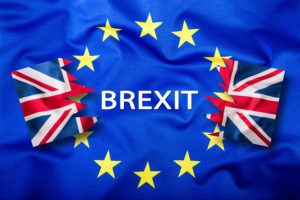

Prime Minister Boris Johnson’s demand that the European Union reopen the Brexit divorce deal was rebuffed on Tuesday by the bloc, which said Britain had failed to propose any realistic alternative to an agreed insurance policy for the Irish border.
After more than three years of Brexit crisis, the United Kingdom is heading towards a showdown with the EU as Johnson has vowed to leave the bloc on Oct. 31 without a deal unless it agrees to renegotiate the divorce terms.
The bloc has repeatedly refused to reopen the Withdrawal Agreement, which includes a protocol on the Irish border “backstop” that then-prime minister Theresa May agreed in November.

In his opening bid to the EU ahead of meetings with French President Emmanuel Macron and German Chancellor Angela Merkel, Johnson wrote a four-page letter to European Council President Donald Tusk.
“I propose that the backstop should be replaced with a commitment to put in place (alternative) arrangements as far as possible before the end of the transition period, as part of the future relationship,” Johnson wrote. “Time is very short.”
Tusk said Johnson had proposed no realistic alternatives, and the European Commission took a similar line, though the EU’s most powerful leaders – Merkel and Macron – had yet to comment.
“Those against the backstop and not proposing realistic alternatives in fact support re-establishing a border. Even if they do not admit it,” Tusk tweeted.
A note seen by Reuters setting out the agreed joint position of the 27 EU states staying on after Brexit said the EU regretted Johnson’s bid to scrap a “necessary, legally operative solution” in favor of a “commitment to try to find a solution.” .
Britain’s pound, sensitive to the prospects of a no-deal departure, promptly fell to near three-year lows against the euro and the dollar.
European diplomats expect little progress on Brexit until the British domestic landscape becomes clearer when parliament returns on Sept. 3 – after which the opposition Labour Party has vowed to try to collapse Johnson’s government.
With British politics in such turmoil, it is still unclear how, when or indeed if the United Kingdom will leave the EU. Many expect an election within months.
With such uncertainty, some suspect perfidy in London.
A diplomat from one EU country told Reuters that Johnson’s letter was “pure PR” and not meant to spur constructive talks but rather set the stage for a “blame game” with the EU.
Brexit Brinkmanship
The riddle of what to do about Ireland’s 500-km (300-mile) land border with the British province of Northern Ireland remains has repeatedly imperiled Brexit talks.
The EU wants to ensure that its only land border with the United Kingdom after Brexit does not become a back door for goods to enter the EU’s single market – which guarantees free movement of goods, capital, services and labor.
But Ireland says checks could undermine the 1998 Good Friday agreement, which brought peace after more than 3,600 died in a three-decade conflict between unionists who wanted Northern Ireland to remain British and Irish nationalists who want Northern Ireland to join a united Ireland ruled from Dublin.
The United Kingdom does not want there to be any border – effective or virtual – between Britain and Northern Ireland. Johnson’s government is propped up by Northern Irish unionists.
The backstop was aimed at squaring the circle: it would keep the United Kingdom in a customs union with the EU until a better solution was found, and keep Northern Ireland aligned to the rules of the EU’s single market.
Johnson wrote that the backstop was anti-democratic and threatened the United Kingdom’s sovereignty as the application of single-market rules in Northern Ireland could divide Northern Ireland from the rest of the UK.
He also said it risked weakening the delicate balance between nationalists and unionists in Northern Ireland.
Dublin does not accept that the backstop is a threat to peace, an Irish government source said. In a call with Johnson, Irish Prime Minister Leo Varadkar reiterated the EU’s position that the Withdrawal Agreement cannot be reopened.
(Additional reporting by Kylie MacLellan in London, Padraic Halpin in Dublin, John Chalmers in Brussels, Michel Rose in Paris; Writing by Guy Faulconbridge.)